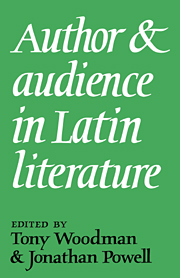Book contents
- Frontmatter
- Contents
- List of contributors
- Prologue
- 1 THE ORATOR AND THE READER: Manipulation and response in Cicero's Fifth Verrine
- 2 STRATAGEMS OF VANITY: Cicero, Ad familiares 5.12 and Pliny's letters
- 3 ‘SHALL I COMPARE THEE…?’: Catullus 68B and the limits of analogy
- 4 ATOMS AND ELEPHANTS: Lucretius 2.522–40
- 5 IN MEMORIAM GALLI: Propertius 1.21
- 6 THE POWER OF IMPLICATION: Horace's invitation to Maecenas (Odes 1.20)
- 7 THE VOICE OF VIRGIL: The pageant of Rome in Aeneid 6
- 8 FROM ORPHEUS TO ASS'S EARS: Ovid, Metamorphoses 10.1–11.193
- 9 POET AND AUDIENCE IN SENECAN TRAGEDY: Phaedra 358–430
- 10 PERSIUS' FIRST SATIRE: A re-examination
- 11 NERO'S ALIEN CAPITAL: Tacitus as paradoxographer (Annals 15.36–7)
- 12 AMOR CLERICALIS
- 13 EPILOGUE
- Notes
- Abbreviations and bibliography
- Indexes
11 - NERO'S ALIEN CAPITAL: Tacitus as paradoxographer (Annals 15.36–7)
Published online by Cambridge University Press: 13 March 2010
- Frontmatter
- Contents
- List of contributors
- Prologue
- 1 THE ORATOR AND THE READER: Manipulation and response in Cicero's Fifth Verrine
- 2 STRATAGEMS OF VANITY: Cicero, Ad familiares 5.12 and Pliny's letters
- 3 ‘SHALL I COMPARE THEE…?’: Catullus 68B and the limits of analogy
- 4 ATOMS AND ELEPHANTS: Lucretius 2.522–40
- 5 IN MEMORIAM GALLI: Propertius 1.21
- 6 THE POWER OF IMPLICATION: Horace's invitation to Maecenas (Odes 1.20)
- 7 THE VOICE OF VIRGIL: The pageant of Rome in Aeneid 6
- 8 FROM ORPHEUS TO ASS'S EARS: Ovid, Metamorphoses 10.1–11.193
- 9 POET AND AUDIENCE IN SENECAN TRAGEDY: Phaedra 358–430
- 10 PERSIUS' FIRST SATIRE: A re-examination
- 11 NERO'S ALIEN CAPITAL: Tacitus as paradoxographer (Annals 15.36–7)
- 12 AMOR CLERICALIS
- 13 EPILOGUE
- Notes
- Abbreviations and bibliography
- Indexes
Summary
THE CONTEXT
According to Tacitus' narrative of A.D. 64, the centrepiece of which will be the Great Fire of Rome (38–41), Nero began the year with a keen desire to go on a concert tour of Greece (33.2). Feeling that he needed some preliminary experience, however, the emperor decided to give a practice performance in Naples, because of its resemblance to a genuinely Greek city. The Neapolitan theatre was packed (33.3), and Suetonius tells us that Nero was captivated by the rhythmic applause of some visitors from Alexandria, whose techniques were subsequently taught to equites and others on the emperor's insistence (Nero 20.3).
When Nero had completed his performance (of which Tacitus pointedly omits all mention), and the crowds had dispersed, the theatre promptly fell to the ground (34.1). Most people interpreted the collapse as a sinister omen (triste), but the emperor himself looked on the bright side and interpreted his escape as providential (prouidum). Then, having duly composed his own Te Deum in thanksgiving, he proceeded on his way to Beneventum for the gladiatorial games of one Vatinius, during which a distinguished ex-consul, Silanus Torquatus, was forced to commit suicide for being a descendant of Augustus like Nero himself (35.1). A charge had been trumped up that he was set on revolution (35.2); and although Nero maintained that the man was indeed guilty, he also said that he as emperor would have shown dementia if Silanus had given him the chance (35.3). On this cynical note Tacitus then passes on to the episode which leads up to the Fire and which is the subject of this discussion (36–7).
- Type
- Chapter
- Information
- Author and Audience in Latin Literature , pp. 173 - 188Publisher: Cambridge University PressPrint publication year: 1992
- 9
- Cited by

